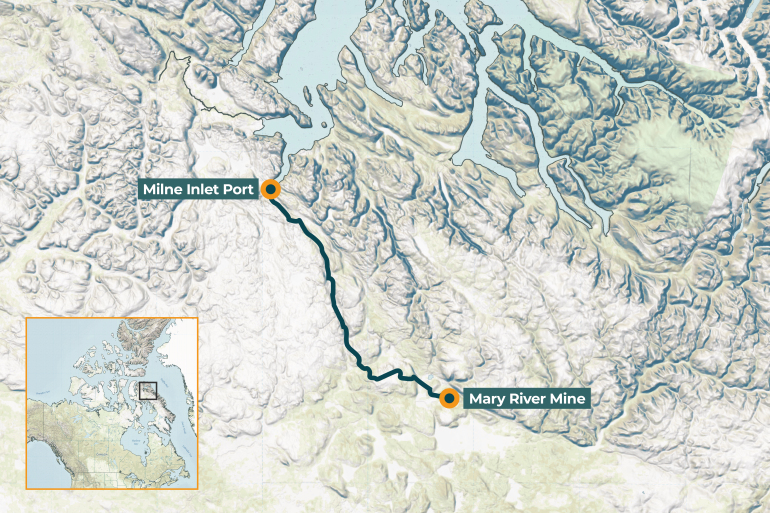Inuit communities have raised opposition to the proposal to expand an iron ore mine on Baffin Island in northern Canada.
An Inuit organisation in the territory of Nunavut in northern Canada has voted against backing the planned expansion of a contentious iron ore mine, after local Inuit communities raised staunch opposition to the proposal.
The Qikiqtani Inuit Association (QIA) said in a statement on Friday that its board of directors passed a resolution to not support the expansion of the Mary River mine on Baffin Island, in the Arctic Archipelago. The QIA is mandated to protect Inuit rights and interests in the area.
The company in charge of the mine, Baffinland Iron Mines Corporation, had proposed doubling its output from six to 12 million tonnes a year, and building a 110km railway connecting the site to a port, as well as a second port dock from which to ship the material.
“Inuit did not participate in the development of the proposal, and key information about project impacts remain unclear. Therefore, the QIA Board will not recommend approval,” QIA President PJ Akeeagok said in the group’s statement.
Inuit hunters had erected a blockade at the Mary River mine last month to protest against the proposed expansion, known as phase two of development.
The hunters, as well as other residents and leaders in Inuit communities on Baffin Island, had raised concerns the project would harm the wildlife they depend on for their survival, including narwhal, seals, caribou and fish.
They also said their voices had not been listened to, while traditional Inuit knowledge – known as Inuit Qaujimajatuqangit – had not been factored into the company’s consideration of potential impacts.
“Inuit are being asked to carry so much risk, with very little benefit, or benefits that come in the form of money, which can’t replace our culture or the wildlife or our harvesting practices,” Eric Ootoovak, chairperson of Mittimatalik Hunters and Trappers Organization (MHTO) in the Inuit hamlet of Pond Inlet, told Al Jazeera last month.
In its statement, the QIA said its board had examined concerns about the effect of dust from the mine, potential consequences on wildlife, the limited inclusion of Inuit knowledge, and the lack of a joint development “Adaptive Management Plan”.
“QIA’s Board of Directors remains open to resource development in the Qikiqtani Region and welcomes proposals from Baffinland that prioritize Inuit involvement from the beginning and which align with an Inuit vision of the future,” it said.
 As part of its phase two expansion, Baffinland plans to build a railway linking the Mary River mine to a port at Milne Inlet [Al Jazeera/Mapbox]
As part of its phase two expansion, Baffinland plans to build a railway linking the Mary River mine to a port at Milne Inlet [Al Jazeera/Mapbox]
In a statement on Saturday, Baffinland said it had taken note of the QIA’s decision, but was “pleased” the organisation said it welcomed proposals to address concerns.
“We have worked with the QIA and others over many years to develop an approach to advancing Mary River that meets strict environmental standards while providing significant control and oversight of mine operation to Inuit,” Baffinland CEO Brian Penney said.
“We will continue our community outreach and seek to meet the QIA and others as soon as practicable to discuss their concerns in order to find a mutually agreeable way forward.”
The expansion is still before the Nunavut Impact Review Board (NIRB), which held environmental assessment hearings in January and February.
After more planned sessions in April, it will give a recommendation to the Canadian federal government on whether to approve it.






